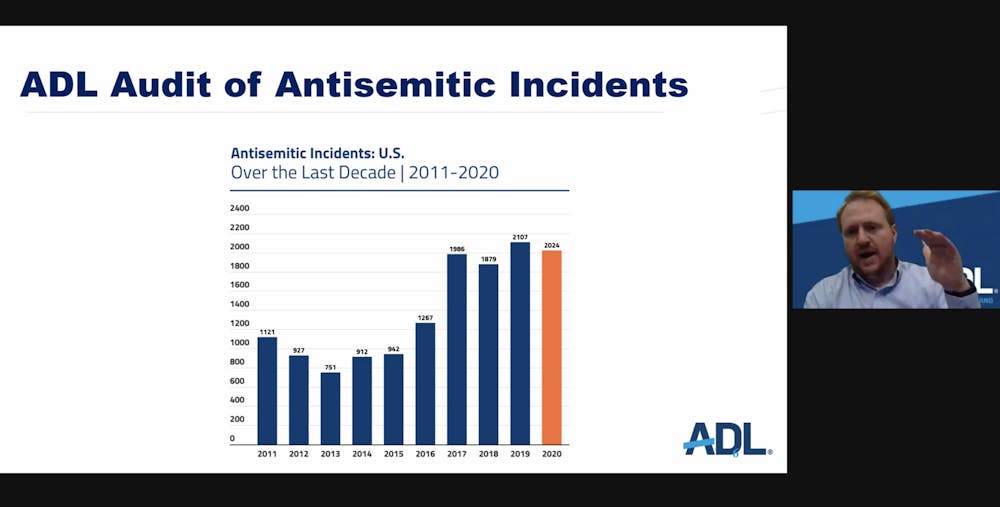After over 75 years since the Holocaust, certain perceptions and manifestations of antisemitism remain in society and as a topic of discussion globally.
In an effort to initiate that discussion, the Jewish Community Legacy Project, or JCLP; the Anti-Defamation League, or ADL and Hillel at Ohio University hosted a conversation on the rise of antisemitism Thursday night via Zoom.
“This isn't new. There's a rise in antisemitism everywhere,” Sarah Livingston, executive director of Hillel at Ohio University, said. “The rise of antisemitism has been emboldened by certain very public spaces, giving voices to those that hate other people.”
Steven Edelstein, a consultant of the JCLP, began the conversation by discussing the support JCLP provides services to small congregations such as Athens.
“When we were asked about topics, which might be of interest to our members, one of the most significant, most frequently mentioned, one was how to deal with antisemitism, a topic which several years ago seemed far off, both in terms of history and geography,” Edelstein said. “Today, unfortunately, we see it in many places.”
James Pasch, the regional director of ADL Cleveland, took over in the first half, providing a presentation and in-depth look at the reports of antisemitism according to the ADL.
With 244 incidents of antisemitism on college campuses in North America reported this past year, Livingston said one of the most important things people can do is talk about what's going on.
“One of the real things that we need everyone to do is we need people to stand up,” Pasch said. “We need you to talk to your friends, to your family, to your colleagues — have uncomfortable conversations when situations arise.”
Within the second half, Livingston presented on reported incidents that have occurred on OU’s campus along with how they have affected students. Livingston went on to read a specific reported incident on campus.
Livingston read about how during a chapter meeting for a girl’s sorority, one of the other girls in the sorority said how she thinks there aren’t “any Jews in Europe,” and “there was a tiny little accident not worth mentioning.” Livingston went on to explain how the girl ended up dropping her sorority due to the antisemitism she experienced.
Livingston made sure to share different stories from students who experienced antisemitism within their school to show how prevalent it can be.
Rabbi Levi Raichik, director of Ohio University Chabad, said there is no antisemitism at Ohio University or Athens as a whole, and it's insulting to OU's students to suggest otherwise.
“As far as Athens goes, I’ve lived in Athens for seven years, and there’s no antisemitism at all in Athens,” Raichik said. “It’s a wonderful place, very loving, warm, open place where everybody loves Jews more than any other places that I’ve been. The university has been nothing but helpful. They go out of their way to help the Jewish community and myself personally, and I’m very grateful, and I find suggestions that there’s an antisemitism problem in Athens or in Ohio University a little bit offensive on behalf of the community here, when it’s just simply not true.”
In Pasch’s portion of the presentation, he presented statistics that showed incidents have increased by over 100% since 2015. In an Alums for Campus Fairness Report, it was found among Jewish students and alums surveyed that 80% had experienced antisemitism.
“Doesn't matter whether you live in a small town or a big city, you have all encountered antisemitism online at this point,” Pasch said. “Whether that's when you're scrolling through your Facebook account, when you're making a TikTok video, it is in your social media feeds.”
Raichik said it’s an internal problem for an individual if they are antisemitic, and it’s not a Jewish person’s job to make someone not hate them.
“To say that Jewish people are responsible for ending antisemitism is, in effect, to blame Jewish people for antisemitism. If we’re responsible for ending it, that means in a way we’re being held responsible for it still existing, which is not fair and not true.”
Livingston and Pasch both advocate that if you see something or experience an antisemitic act, report it. To report anti-semitic incidents or behaviors on a college campus, visit https://www.reportcampushate.org/.






